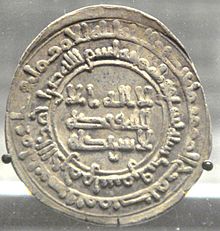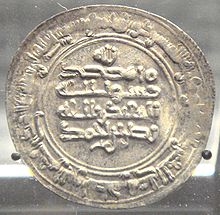- Nasr II
-
Nasr II (died 943) was amir of the Samanids (914–943). His reign saw the high point of Samanid rule. He was the son of Ahmad ibn Isma’il.
Nasr became amir at the age of eight following his father’s assassination in January of 914. Due to his youth, his prime minister Abu ’Abd-Allah al-Jaihani undertook the regency. Almost immediately a series of revolts broke out within the state, the most serious being the one led by his great-uncle Ishaq ibn Ahmad. Ishaq’s sons took part in the rebellion; one son, Mansur, took control of Nishapur and several other cities in Khurasan. Eventually, Ishaq was captured, while Mansur died in Nishapur.
Nasr’s ascension also brought instability to the peripheries of the Samanid state. The Abbasids managed to recover Sistan for the last time, while Ray and Tabaristan were taken by the Alid al-Utrush. Despite being unable to recover the provinces, the Samanids employed numerous local Dailamite and Gilite leaders and remained active in the struggles there. A threat of mobilization by Nasr in 933 prompted the Ziyarid Mardavij, who had become the dominant power in the region, to surrender Gurgan and pay tribute for his possession of Ray. Mardavij’s brother Vushmgir, who took power in 935, accepted Samanid overlordship; Samanid armies from that point on were heavily involved in protecting the Ziyarids from the Buyids, who were rising in central Persia.
Jaihani was removed in 922 by Nasr on account of his suspected Shi’i beliefs. He was replaced by Abu’l-Fadl al-Bal’ami, who for the most part continued his predecessor’s policies. In 929 a revolt by Nasr’s brothers broke out. They proclaimed one of their own, Yahya, as amir. Bal’ami managed to quell the rebellion by turning the brothers against each other. In 938 Jaihani was reinstated as prime minister, which he held until 941.
Nasr’s ministers helped turn the Samanid court into a cultural center. Jaihani was known as an author and wrote a geographical work. His interest in the subject caused him to invite geographers from many places to Bukhara. Scientists, astronomers, and others also flocked to the city. Bal’ami likewise was interested in the arts and patronized intellectuals and authors.
In 943 several Samanid army officers, angry at Nasr’s support of Isma’ili missionaries, formed a conspiracy to murder the amir. Nasr’s son Nuh, however, learned of the plan. He went to a banquet designed to organize the plot and decapitated their leader. To placate the other officers, he promised to stop the Isma’ili missionaries from continuing their activities. Nasr was then convinced by Nuh to abdicate; he died shortly after.
References
- R.N. Frye (1975). The Cambridge History of Iran, Volume Four: From the Arab Invasion to the Saljuqs. ISBN 0-521-20093-8
Preceded by:
Ahmad ibn Isma'ilSamanid Ruler
914–943Followed by:
Nuh ICategories:- Samanids
- 943 deaths
- Medieval child rulers
- 10th-century monarchs in Asia
- Amirs of Nishapur
Wikimedia Foundation. 2010.


